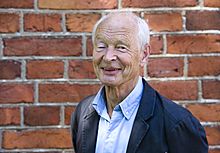Guus Kuijer facts for kids
Quick facts for kids
Guus Kuijer
|
|
|---|---|

Kuijer in 2012
|
|
| Born | 1 August 1942 Amsterdam, Netherlands |
| Occupation | Teacher (1967–1973) Writer (1971 to date) |
| Language | Dutch |
| Education | Bachelor of Education |
| Genre | Children's literature |
| Notable awards | Gouden Griffel 1976, 1979, 2000, 2005 Golden Owl 2005 Astrid Lindgren Award 2012 |
Guus Kuijer (born August 1, 1942) is a famous Dutch writer. He writes books for both children and adults. He is best known for his popular Madelief series of children's books.
In 2012, Guus Kuijer won the Astrid Lindgren Memorial Award. This is the biggest prize in the world for children's literature. He was also a finalist for the Hans Christian Andersen Award in 2008. This award is given every two years to a great children's writer.
Contents
Guus Kuijer's Early Life
Guus Kuijer was born in Amsterdam, Netherlands, on August 1, 1942. His parents were part of a church group. However, Guus Kuijer has said he never really believed in God himself.
He went to a special school in Doetinchem to become a teacher. From 1967 to 1973, he worked as a primary school teacher.
Becoming a Writer
Guus Kuijer started writing short stories in 1968. These stories appeared in a magazine called Hollands Maandblad. In 1971, he published a collection of his short stories.
In 1973, he decided to stop teaching. He wanted to become a full-time writer. That same year, he published his first novel for adults, called Het dochtertje van de wasvrouw.
His first children's book was Met de poppen gooien, published in 1975. This book was very popular. He won a Gouden Griffel award for it in 1976. Met de poppen gooien was the first of five books about a girl named Madelief. Madelief means "Daisy" in Dutch.
Books Made into Movies and TV Shows
Many of Guus Kuijer's books have been turned into movies and TV shows.
The Madelief Series
His book series about Madelief (written from 1975 to 1979) became very popular.
- A television series called Madelief was made in 1994.
- A movie based on the books, Scratches in the Table, came out in 1998.
The Polleke Series
His Polleke book series (written from 1999 to 2001) also became successful on screen.
- A movie called Polleke was released in 2003.
- A television series, also named Polleke, followed in 2005.
The Book of Everything
In 2011, an Australian writer named Richard Tulloch translated Het boek van alle dingen into English. He also turned it into a play. This play was very successful when it was performed in 2013.
Awards and Recognition
Guus Kuijer has won many important awards for his writing.
- 1976 – Gouden Griffel for Met de poppen gooien
- 1977 – Zilveren Griffel for Grote mensen, daar kun je beter soep van koken
- 1979 – Staatsprijs voor kinder- en jeugdliteratuur (a major Dutch state prize for children's literature)
- 1979 – Gouden Griffel for Krassen in het tafelblad
- 1984 – Zilveren Griffel for Eend voor eend
- 1988 – Zilveren Griffel for Tin Toeval en de kunst van het verdwalen / Tin Toeval en het geheim van tweebeenseiland
- 2000 – Gouden Griffel for Voor altijd samen, amen
- 2002 – Zilveren Griffel for Met de wind mee naar de zee
- 2003 – Woutertje Pieterse Prijs for Ik ben Polleke hoor!
- 2005 – Gouden Griffel for Het boek van alle dingen
- 2005 – Gouden Uil jeugdliteratuurprijs for Het boek van alle dingen
- 2007 – E. du Perronprijs for Hoe een klein rotgodje god vermoordde (2006) and Het doden van een mens (2007)
- 2012 – Astrid Lindgren Memorial Award
Images for kids
 | May Edward Chinn |
 | Rebecca Cole |
 | Alexa Canady |
 | Dorothy Lavinia Brown |


